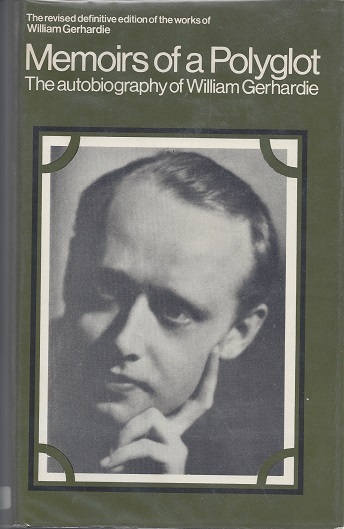Memoirs of a Polyglot: The Autobiography of William Gerhardie by William Gerhardie. New York. 1973. St Martin's Press. hardcover. 408 pages. Preface by Michael Holroyd. 0356031470.
 FROM THE PUBLISHER -
FROM THE PUBLISHER -
Written with a rare candour, this enchanting and entertaining book describes the early life of this ‘unique, isolated and important figure in English letters.’ William Gerhardie has been quoted as saying that his hopes lie in ‘ever being discovered astonishingly anew.’ He has revised and briefly expanded his autobiography (first written in 1931) for its inclusion in Macdonald’s new definitive editions of his works, all of which are introduced by Prefaces by Michael Holroyd. Mr Gerhardie writes about his grandparents and parents, and about his childhood in St Petersburg where his father, a Br1tish cotton manufacturer settled in the 1890s. He joined the Scots Greys in the First World War, was commissioned and posted to the British Embassy at Petrograd, where he saw the Russian Revolution in various stages. MEMOIRS OF A POLYGLOT is illustrated with photographs, many of them charming examples from family albums. At Oxford, he wrote FUTILITY, the first of his novels. MEMOIRS OF A POLYGLOT wonderfully illuminates the literary personality and the enduring works of this author, of whom C. P. Snow has said: ‘He is a comic writer of genus. but his art is profoundly serious. William Gerhardie was the friend some of the most interesting people of the 1920s and 1930s - from Beaverbrook to the Sitweils - and writes brilliantly, and amusingly about the literary and political scene. ‘The narrative,’ Michael Holroyd says in his Preface, ‘which contains so many percipient little pen portraits, stops for no man, but merely seems to pick them up in its stride.’ As Michael Ivens has commented, William Gerhardie’s life has been full of ‘odd and incredible events’ and these - including many travels - are described in MEMOIRS OF A POLYGLOT with zest, humour and remarkable insight.
 William Alexander Gerhardie (1895-1977) was a British (Anglo-Russian) novelist and playwright. Gerhardie (or Gerhardi: he added the ‘e’ in later years as an affectation) was one of the most critically acclaimed English novelists of the 1920s (Evelyn Waugh told him ‘I have talent, but you have genius’). H.G Wells was a ferocious champion of his work. His first novel Futility, was written while he was at Cambridge and drew on his experiences in Russia fighting (or attempting to fight) the Bolsheviks, along with his childhood experiences visiting pre-revolutionary Russia. Some say that it was the first work in English to fully explore the theme of ‘waiting’ later made famous by Samuel Beckett in WAITING FOR GODOT, but it is probably more apt to recognize a common comic nihilism between those two figures. His next novel, THE POLYGLOTS is probably his masterpiece (although some argue for DOOM). Again it deals with Russia (Gerhardie was strongly influenced by the tragi-comic style of Russian writers such as Chekhov who he wrote a study of while in College). He collaborated with Hugh Kingsmill on the biography ‘The Casanova Fable’, his friendship with Hugh being both a source of conflict over women and a great intellectual stimulus. After World War II Gerhardie’s star waned, and he became unfashionable, and although he continued to write, he had nothing published after 1939. After a period of poverty-stricken oblivion, he lived to see two ‘definitive collected works’ published by Macdonald (in 1947-49 and then revised again in 1970-74). More recently, both Prion and New Directions Press have been reissuing his works. Asked how to say his name, he told The Literary Digest ‘Pronounced jer (as Ger in Gerald) hardy, with the accent on the a: jer-har’dy. This is the way I and my relatives pronounce it, tho I am told it is incorrect. Philologists are of the opinion that it should be pronounced with the g as in Gertrude. I believe they are right. I, however, cling to the family habit of mispronouncing it. But I do so without obstinacy. If the world made it worth my while I would side with the multitude.’ (Charles Earle Funk, What’s the Name, Please?, Funk & Wagnalls, 1936).
William Alexander Gerhardie (1895-1977) was a British (Anglo-Russian) novelist and playwright. Gerhardie (or Gerhardi: he added the ‘e’ in later years as an affectation) was one of the most critically acclaimed English novelists of the 1920s (Evelyn Waugh told him ‘I have talent, but you have genius’). H.G Wells was a ferocious champion of his work. His first novel Futility, was written while he was at Cambridge and drew on his experiences in Russia fighting (or attempting to fight) the Bolsheviks, along with his childhood experiences visiting pre-revolutionary Russia. Some say that it was the first work in English to fully explore the theme of ‘waiting’ later made famous by Samuel Beckett in WAITING FOR GODOT, but it is probably more apt to recognize a common comic nihilism between those two figures. His next novel, THE POLYGLOTS is probably his masterpiece (although some argue for DOOM). Again it deals with Russia (Gerhardie was strongly influenced by the tragi-comic style of Russian writers such as Chekhov who he wrote a study of while in College). He collaborated with Hugh Kingsmill on the biography ‘The Casanova Fable’, his friendship with Hugh being both a source of conflict over women and a great intellectual stimulus. After World War II Gerhardie’s star waned, and he became unfashionable, and although he continued to write, he had nothing published after 1939. After a period of poverty-stricken oblivion, he lived to see two ‘definitive collected works’ published by Macdonald (in 1947-49 and then revised again in 1970-74). More recently, both Prion and New Directions Press have been reissuing his works. Asked how to say his name, he told The Literary Digest ‘Pronounced jer (as Ger in Gerald) hardy, with the accent on the a: jer-har’dy. This is the way I and my relatives pronounce it, tho I am told it is incorrect. Philologists are of the opinion that it should be pronounced with the g as in Gertrude. I believe they are right. I, however, cling to the family habit of mispronouncing it. But I do so without obstinacy. If the world made it worth my while I would side with the multitude.’ (Charles Earle Funk, What’s the Name, Please?, Funk & Wagnalls, 1936).